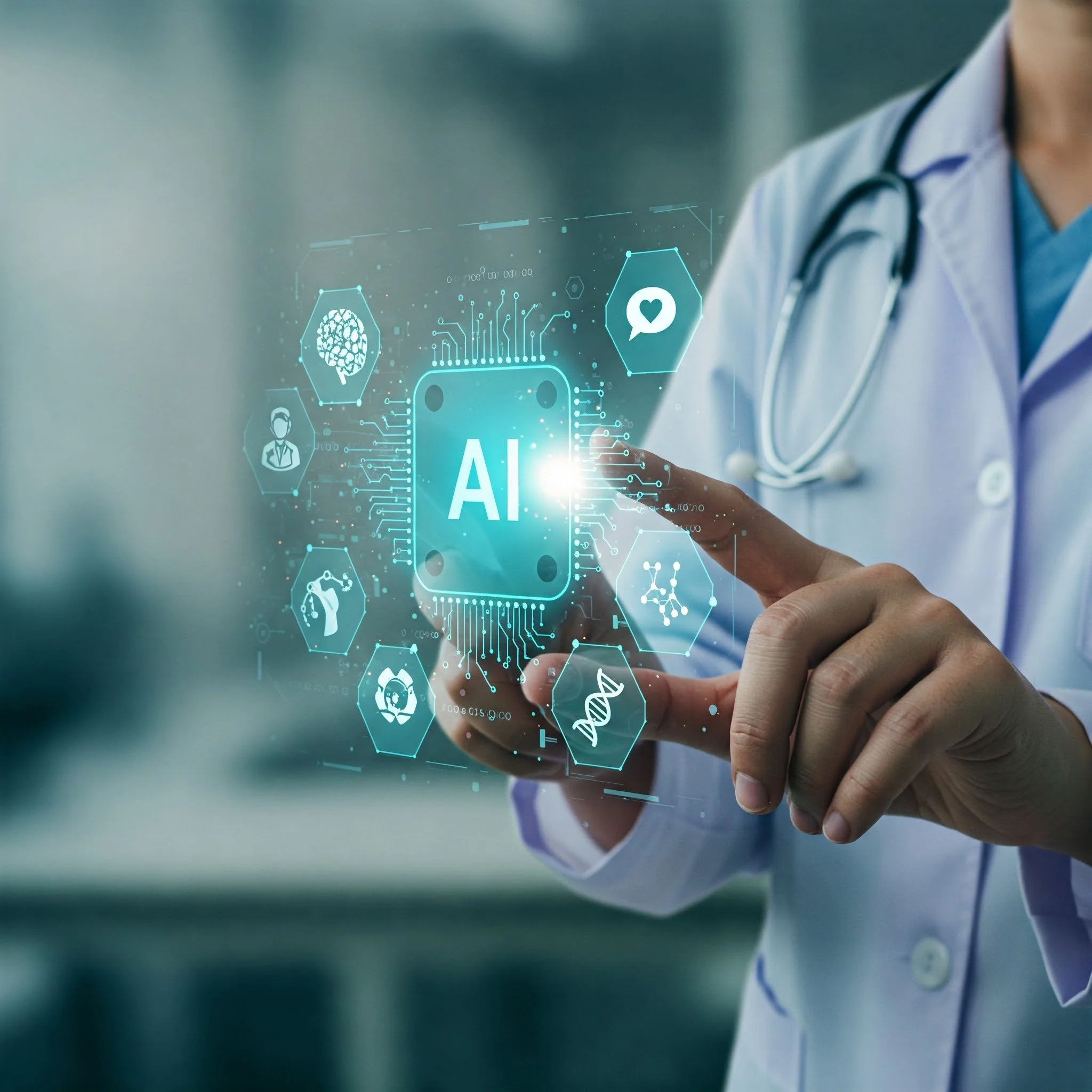How AI Is Revolutionizing Healthcare (And Keeping the Doctor In)
Artificial Intelligence (AI) is steadily becoming the superstar intern of the healthcare world—tireless, ever‑vigilant, and always ready to lend a digital hand. Whether you’re a family doctor managing packed appointment books or a surgeon juggling back‑to‑back procedures, AI tools have moved far beyond futuristic prototypes to become indispensable helpers in today’s medical landscape. With the ability to process data faster than a caffeine‑fueled resident, these systems serve up insights that can lead to earlier diagnoses, more targeted treatments, and—most importantly—enhanced patient outcomes.
Beyond the clinical spotlight, AI also works behind the scenes, tackling administrative tedium and streamlining the paperwork nightmare that has become synonymous with modern healthcare. Think automated scheduling, prompt‑based documentation, and intelligent chatbots, all freeing up precious time and mental bandwidth for healthcare professionals to focus on true face‑to‑face patient care.
Below are five compelling examples of how AI is reshaping the healthcare scene right now, complete with real‑world case studies that prove this technology isn’t just hype. After exploring these big‑ticket transformations—ranging from AI‑guided surgeries to more efficient drug discovery—we’ll dive into the practical side with ready‑to‑use “Prompts for Physicians.” These prompts are designed to supercharge your daily workflow, helping you communicate more clearly with patients, draft error‑free documentation, and elevate your practice efficiency to new heights.
Interesting Ways AI Is Shaking Up Healthcare
1. AI‑Driven Diagnostics and Rapid Discovery
Think of AI as the ultimate diagnostic partner. Instead of manually sifting through reams of patient data, these digital powerhouses analyze symptoms, medical images, and lab results to pinpoint issues at lightning speed—like that friend who always knows the hot gossip before anyone else.
Real‑Life Example:
Orakl from Meta uses advanced computer vision models (like DINOv2) to speed up cancer research. By identifying small yet crucial details in scans, Orakl helps medical teams detect early signs of cancer and plan more effective treatments.
2. Robot Surgeons and Smart Procedures
AI‑powered surgical robots are like having a tireless, ultra‑steady partner in the operating room. They analyze movements and guide instruments with extreme precision, reducing the chance of human error and making “steady hands” an everyday reality.
Real‑Life Example:
The da Vinci Surgical System is used globally for minimally invasive procedures. Surgeons benefit from robotic “hands” with a finer range of motion than any human, leading to smaller incisions, less scarring, and quicker patient recovery—fewer days stuck eating hospital Jell‑O (unless you really like the lime flavor).
3. Chatty Bots and Personalized Health
Ever chatted with a health portal’s virtual assistant that felt more like a friendly nurse than a soulless bot? That’s AI at work! Chatbots can tackle routine questions—like “Is this medication safe with my morning coffee?”—so doctors and nurses can focus on more complex tasks. They can even learn patient preferences to deliver personalized advice.
Real‑Life Example:
Babylon Health’s AI‑driven app employs chatbots to provide triage advice. By guiding patients through an interactive symptom checker, it quickly directs them to the right level of care, be it an ER visit, a same‑day telemedicine appointment, or a friendly reminder to stay hydrated.
4. AI‑Powered Drug Discovery
Finding new medications can be a lengthy—and pricey—process. AI tools can quickly mine huge sets of genetic, clinical, and molecular data to spot promising drug targets. Think of it like scanning a giant “Where’s Waldo?” in record speed but with life‑saving implications.
Real‑Life Example:
AlphaFold by DeepMind has transformed how researchers predict protein structures, helping them understand disease mechanisms faster. This means major time (and cost) savings for pharmaceutical R&D, bringing potential treatments to patients quicker.
5. Workflow Wizards and Administrative Timesavers
From scheduling appointments to handling billing, healthcare organizations run on a never‑ending stream of paperwork and phone calls. AI can streamline these chores, giving hospital staff more face time with patients and less time wrestling with lost forms.
Real‑Life Example:
Olive provides AI and automation solutions that handle tasks like insurance eligibility checks and data entry. By freeing up human time, it helps clinics and hospitals deliver a better overall experience—physicians, nurses, and administrators can focus on the work that truly needs a human touch.
Incorporating “Prompts for Physicians” into Your AI Workflow
Now that we’ve explored how AI is reshaping healthcare, it’s time to look at how physicians can make the most of these tools day to day. The “Prompts for Physicians” document offers a treasure trove of ways to streamline tasks using AI—whether you’re connecting with patients or collaborating with specialists.
Patient Communication
Use AI to: Provide simple explanations of complex conditions or treatments, draft empathetic messages to concerned patients, and streamline everyday conversations.
Sample Prompt: “Compose a response to a patient concerned about the side effects of [medication], offering reassurance and guidance.”
Medical Documentation
Use AI to: Draft concise clinical notes, generate discharge instructions, or summarize patient visits—cutting back on repetitive, time‑consuming writing.
Sample Prompt: “Draft a concise summary of a patient visit for [medical condition], highlighting key observations and next steps.”
Research and Education
Use AI to: Stay on top of the latest studies, craft lecture outlines, or create quizzes for medical students.
Sample Prompt: “Summarize the key findings of the latest research on [medical topic] and discuss its clinical implications.”
AI is reshaping healthcare from the inside out, revolutionizing everything from diagnosing illnesses to optimizing administrative tasks. By integrating these technologies, you empower your team to spend more time where it matters most—caring for patients.
Ready to bring AI into your own practice? Sign up for DemystifAI's exclusive “AI Resources for Healthcare Providers” to receive 15 customized AI prompts for medical professionals, plus an in‑depth white paper, “AI in Action: Transforming Academic Medicine with Practical Tools.” It’s your go‑to guide for harnessing AI’s potential to streamline workflows, enhance patient care, and stay at the cutting edge of modern medicine.

